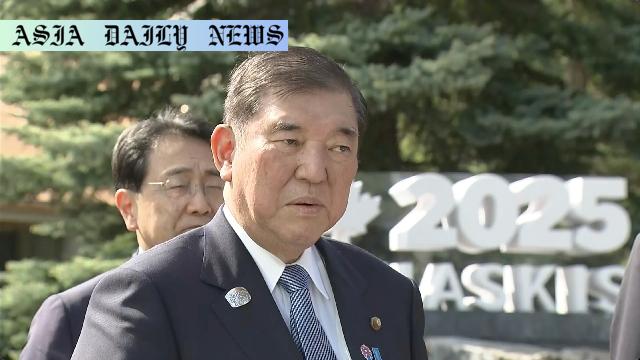Diplomatic Efforts: Ishiba calls for easing Middle East tensions and continuing G7 unity amidst global conflicts.

Japan’s Call for Diplomatic Intervention to Ease Tensions
Japanese Prime Minister Ishiba Shigeru’s strong advocacy for diplomacy in handling global conflicts underlines Japan’s commitment to peace. At the recent G7 summit in Canada, Ishiba highlighted his country’s proactive role in quelling escalating tensions between Israel and Iran. This urgent call for dialogue arose amidst military confrontations in the Gaza Strip and the broader Middle East, which have severely impacted regional stability.
Ishiba reiterated Japan’s stance on preventing nuclear proliferation, specifically emphasizing that Iran must never become a nuclear power. By aligning with other G7 member states, he underscored the necessity of resolving nuclear issues through cooperative dialogues. His remarks resonate with Japan’s historical commitment to peace and security, calling on all nations to work collaboratively to minimize potential risks stemming from military escalations in conflict-prone regions.
Unity on Ukraine and the Global Impact of War
The G7 summit further highlighted a unified stance on Russia’s invasion of Ukraine, with Ishiba stressing the importance of combined efforts in seeking a fair and durable peace. The ongoing war in Ukraine poses a broader threat to international order, requiring effective and united global diplomacy to explore resolutions.
Japan has demonstrated unequivocal support for Ukraine, promoting consistent sanctions against Russia. Additionally, emerging concerns about expanding military ties between Russia and North Korea signal an urgent need for enhanced vigilance. Ishiba underscored the relevance of Japan’s collaboration with Asian allies and increased Indo-Pacific cooperation to counter these growing threats.
Tackling China’s Strategic Influence in the Global Arena
Ishiba’s commentary also addressed China’s controversial global role. China’s indirect support for Russia, enabling its capacity to continue military activities, was a contentious point during the G7 discussions. Ishiba emphasized the importance of the Indo-Pacific region as a vital strategic focus for global security. Engaging with Asian economies and tackling challenges created by China’s expanding footprint were flagged as top priorities.
Furthermore, North Korea’s accelerating nuclear weapon and missile programs remain a shared concern among G7 nations. Ishiba urged closer communication and continued efforts toward a denuclearized Korean Peninsula, showcasing Japan’s dedication to regional harmony and stability.
Diplomacy as a Tool for Global Peacebuilding
The discussions at the summit underscore a profound belief in diplomacy as a transformative tool for peacebuilding. PM Ishiba’s emphasis on negotiation, collaboration, and proactive international dialogue champions a multidimensional approach to resolving geopolitical crises. His efforts suggest that resolving complex challenges, whether in the Middle East or Europe, requires long-term commitment and unyielding global cooperation.
By fostering unity among the G7 nations and promoting intensified regional partnerships, Ishiba aims to mitigate crisis situations while presenting Japan as a pivotal player in fostering world peace. His leadership reflects Japan’s enduring commitment to international dialogue and conflict resolution.
Commentary
The Crucial Role of Diplomacy in Turbulent Times
In a world constantly facing mounting geopolitical challenges, Prime Minister Ishiba’s dedication to diplomacy as a foundational solution is commendable. Addressing Israel-Iran tensions amidst active conflict in the Gaza Strip is an uphill battle, but Japan’s proactive stance conveys an essential message: negotiation and dialogue must take precedence over violence and warfare.
The significance of the G7’s collective efforts cannot be overstated, especially when confronting pressing issues such as nuclear proliferation and global security. Prime Minister Ishiba’s reaffirmation of these priorities underscores the importance of collaboration among leading nations to maintain stability. Few moments in history have demanded this unity so urgently, and with countries like Japan leading the way, a peaceful resolution seems at least attainable.
Indo-Pacific: A Critical Focus in Global Diplomacy
Taking a strategic approach to the Indo-Pacific region highlights Japan’s pragmatic outlook toward maintaining regional balance. As China’s global influence continues to rise, addressing its implications is imperative to establishing long-term stability. Ishiba’s initiative to engage with Asian leaders reflects Japan’s understanding of the critical role this region will play in shaping the future of global peaceful cooperation.
Concerns about North Korea and its expanding military capabilities also warrant greater attention. These developments create perpetual unease near Japan’s borders and underscore the necessity of establishing a framework for sustained peace dialogues in East Asia.
Global Unity for Lasting Peace
Ishiba’s remarks at the G7 summit embody a hopeful outlook that prioritizes unity and proactive problem-solving. His firm stance against Russia’s invasion of Ukraine, coupled with his concerns over North Korea’s and China’s geopolitical activities, exemplifies a balanced and forward-thinking approach. If the G7 nations continue promoting transparency and cooperation, they will have a much better chance of navigating these turbulent times successfully.
Ultimately, the summit’s themes reaffirm a universal truth: building peace is a shared responsibility. Japan’s leadership, guided by Ishiba’s vision, is an excellent example of a nation rising to this responsibility with diligence and determination.


